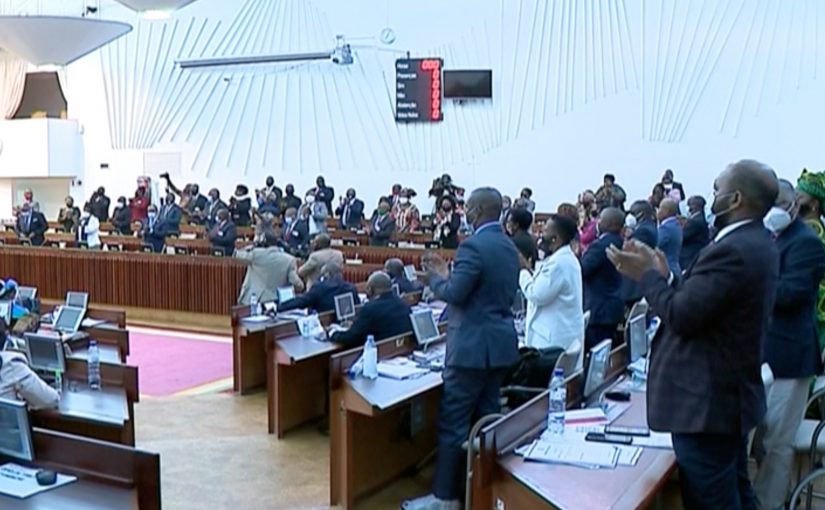Mozambique: Chissano calls for a return to ideals of the liberation struggles - Watch
Mozambique: Assembly approves report on state of emergency – AIM report

Photo: TVM
The Mozambican parliament, the Assembly of the Republic, meeting in Maputo in an extraordinary sitting, on Tuesday night passed a resolution approving the report delivered by President Filipe Nyusi on the state of emergency that was in force between 1 April and 29 July.
The resolution passed because the 170 deputies of the majority Frelimo Party present all voted in favour. Both opposition parties, Renamo and the Mozambique Democratic Movement (MDM), with 53 deputies between them, voted against.
Frelimo praised Nyusi’s report, saying that it gave detailed information about the measures taken under the state of emergency to prevent the spread of the coronavirus that causes the Covid-19 respiratory disease. The report also briefed the deputies about the mobilisation of financial resources from the country’s cooperation partners to face the challenges emerging from the pandemic.
Frelimo deputy Ana Rita Sithole said the resolution should be passed because “the measures taken were correct and legitimate. Above all, they were indispensable”.
“The country has managed to delay the peak of the epidemic and has avoided the collapse of our health system”, said Sithole.
The opposition did not agree, and was particularly angered that contracts related to the pandemic had not been awarded by competitive tenders. Instead, the government, on the grounds that there was not enough time to organise the normal tenders, awarded contracts to companies directly.
Renamo deputy Saide Fidel protested that Nyusi’s report did not contain the names of the companies that had benefited from the direct award of contracts. Nor did it give any details about the goods distributed to needy households.
Fidel then made an unjustified attack on the health system claiming that it had been unable to trace the contacts of people who tested positive for Covid-19 and were then placed in isolation wards. Had Fidel bothered to read the daily briefings from the National Health Institute (INS), he would have known that a large number (though by no means all) of the contacts have been identified and traced, and a significant number of the new cases announced every day are diagnosed precisely because of contact tracing.
For the MDM, Elias Impuiri protested that Nyusi himself should have come to the Assembly to deliver his report, instead of delegating that task to Justice Minister Helena Kida.
He claimed that some measures initially promised by the government, such as reducing the rate of Value Added Tax (VAT) to be paid on water and electricity bills had not been implemented. Instead, households had found themselves faced with exceptionally high water bills, sometimes two or three times the normal monthly bill.
He neglected to add that the water companies, notably the Maputo water company, have been forced to reverse these exorbitant charges. The justification for the high water bills was that they covered more than one month’s consumption. Now the companies have been forced to make corrections in the bills to be paid in August.
Impuiri also protested that the promised support from the Treasury for small and medium companies “has not happened – or, if it has, give us the names of the beneficiary companies”.
He said that the report did not give “the real numbers of our fellow citizens in the informal sector who had lost their livelihoods”, because of the government restrictions on informal markets, and its crackdown against people selling goods on the public highway.
Opposition deputies also called for a list of citizens “affected” by the emergency measures. It was not at all clear what they meant by this: in the broad sense, everybody in the country was affected by the measures.
But if the deputies wanted to know the names of everyone who tested positive for Covid-19, or of the 15 people who had died from the disease, Kida told them the government was not going to release that information, since the Mozambican Constitution protects citizens’ right to privacy.
Nyusi’s report claimed that, in general, the aims of the state of emergency had been achieved. “The number of cases of Covid-19 per million inhabitants was one of the lowest in the world”, it said. “The level of transmission per million inhabitants was one of the lowest in Africa and in SADC (Southern African Development Community), and the number of deaths per million inhabitants was also one of the lowest”.
At the end of the day’s brief session, the Assembly chairperson, Esperanca Bias, urged the public not to drop their guard against Covid-19. “The end of the state of emergency does not mean relaxing the measures of prevention against the pandemic”, she said.
The Assembly’s resolution does not mandate any further measures to replace the state of emergency. At the end of the session, Kida said Nyusi will announce new measures in the very near future.
The President is due to address the nation on Wednesday night.












Leave a Reply
Be the First to Comment!
You must be logged in to post a comment.
You must be logged in to post a comment.